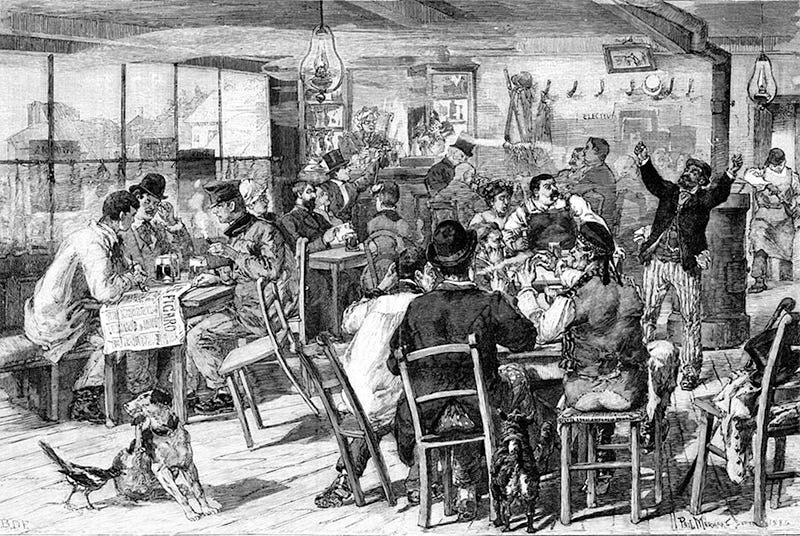Also on today’s menu:
Routers, ‘Internet Of Things’ At Risk
Pegasus More Dangerous Than The Bomb
The News Cafe’s platform, Substack, is one of the few remaining places where moderators do not intervene to decide what readers will be allowed to see. Amidst increasing pressure to censor “misinformation”, the big social media platforms such as Facebook and Twitter are caving in to the argument that people should not be allowed to see content that may not be absolutely correct, or politically correct. That is especially true when it comes to news about masking and vaccines.
In a recent post from Hamish McKenzie, Chris Best, and Jairaj of Substack, they note that, last year, in an interview with the New York Times, anthropologist Heidi Larson, founder of the Vaccine Confidence Project, said that efforts to silence people who doubt the efficacy of the Covid-19 vaccines won’t get us very far.
If you shut down Facebook tomorrow, it’s not going to make this go away. It’ll just move. … We don’t have a misinformation problem; we have a trust problem.”
Social media platforms that amplify contentious content contribute to the intensification and spread of mistrust, the Substack post continues. They ratchet up the pressure on traditional media to choose attention-getting content. “People start to fixate on branding their opponents as peddlers of dangerous misinformation, threats to democracy, terrorists, and charlatans. In a frenzy to kill all the monsters, we keep creating more monsters — and then feeding them. All the while, the range of acceptable viewpoints and voices within each group gets ever-narrower.”
It is a position we have always maintained: Censorship only builds mistrust and, in fact, ramps up interest in the banned material. It goes both ways, with material banned because it spreads false information and material banned because a political faction does not like the truth to be out there. A friend recently posted on Facebook, “Nothing makes me want to read a book more, than one that some ‘board’ thinks should be banned.”
It is important to hear from both sides because, usually, the truth lies somewhere between the extremes. In talking through the disagreements, one can gain some respect from the other’s position, rather than vilifying him. As the Substack post says, “Trust can’t be won with a press release or a social media ban; and it can’t be strengthened by turning away from hard conversations. It comes from building and respecting relationships.”
Routers, ‘Internet Of Things’ At Risk
A new article on computer hacking reports that the authors of harmful malware have uploaded its supply code to GitHub, which means more criminals will be able to create new variants for future assaults. The malware puts “thousands and thousands of routers and Internet of Things (IoT) gadgets” at risk.
Researchers at AT&T Alien Labs first noticed the malware known as “BotenaGo” last November. The malware is written in a programming language that is filled with ways to exploit more than 30 vulnerabilities in merchandise including Linksys, D-Link, Netgear, and ZTE. Among them are two backdoor ports for listening to and receiving IP addresses or setting a listener to receive information.
“Alien Labs expects to see new campaigns based on BotenaGo variants targeting routers and IoT devices globally,” Alien Labs malware researcher Ofer Caspi said.
Pegasus More Dangerous Than The Bomb
Cyberweapons have changed international relations more profoundly than any advance since the advent of the atomic bomb. In some ways, they are even more profoundly destabilizing — they are cheap, easily distributed and can be deployed without consequences to the attacker. Dealing with their proliferation is radically changing the nature of state relations, as Israel long ago discovered and the rest of the world is now also beginning to understand.
— Ronen Bergman and Mark Mazzetti, New York Times
An Israeli company released a spyware product known as Pegasus in 2011, which could reliably decipher the communications of smartphones without the phone’s user knowing and without the cooperation of the companies such as AT&T and Apple that manufacture the phones.
Mexico’s government was able to use Pegasus to capture drug lord El Chapo, and European investigators used the product to break up a child sex-abuse ring and stop terrorist plots. However, the spyware also has allowed governments to monitor and suppress critics and political opponents.
The FBI and CIA have purchased a copy of Pegasus, according to the Times, and while both the Trump and Biden administrations have debated whether to use it within this country as well as abroad, the government’s copy is sitting in a New Jersey office building, ready to be turned on if the federal government changes its policy.
Please Support Our Efforts
The News Café is a virtual meeting place where we discuss the news of the day. An effort by the Liberty Independent Media Project, the work does not rely on advertising, as most media outlets do, freeing us to provide an independent focus on events and cultural issues. The project instead relies on direct monetary support from donors and subscribers.
If you like what we’re doing, please give what you can. Subscriptions to this newsletter are available for as little as $5 per month. Subscribers can share their knowledge, thoughts, and questions about any topic, and we may select some of those subjects for more in-depth analysis.
If you’re unable to pay but still want to receive all of the free public posts in your in-box, click the Subscribe button and select a free subscription.
Subscribe to The News Café
Exchanging and Engaging in News Topics













